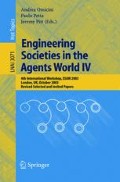Abstract
Natural forming multi-agent systems can grow to enormous sizes and perform seemingly complex tasks without the existence of any centralized control. Their success comes from the fact that agents are simple and the interaction with the environment and neighboring agents is local in nature. We describe how swarm intelligence can be used in the implementation of a Linda-based system called SwarmLinda. We argue that SwarmLinda achieves many desired characteristics such as scalability, adaptiveness and even some level of fault-tolerance.
This work has been partially funded by the DAAD (Germany) and the NSF (USA) contract numbers D/03/34491 and INT-0337161 respectively.
Access this chapter
Tax calculation will be finalised at checkout
Purchases are for personal use only
Preview
Unable to display preview. Download preview PDF.
References
Gelernter, D.: Generative Communication in Linda. ACM Transactions on Programming Languages and Systems 7, 80–112 (1985)
Gelernter, D.: Multiple tuple spaces in Linda. In: Odijk, E., Rem, M., Syre, J.-C. (eds.) PARLE 1989. LNCS, vol. 366, pp. 20–27. Springer, Heidelberg (1989)
Parunak, H.: “Go to the ant”: Engineering principles from natural multi-agent systems. Annals of Operations Research 75, 69–101 (1997)
Obreiter, P., Gräf, G.: Towards scalability in tuple spaces. In: Proceedings of the 2002 Symposium on Applied Computing, pp. 344–350. ACM, New York (2002)
Zambonelli, F., Corradi, A., Leonardi, L.: A scalable tuple space model for structured parallel programming. In: Proc. of the 1995 2nd Int’l Conf. on Programming Models for Massively Parallel Computers (1995)
Rowstron, A.: WCL: A co-ordination language for geographically distributed agents. World Wide Web 1, 167–179 (1998)
Menezes, R., Tolksdorf, R., Wood, A.: Coordination and scalability. In: Omicini, A., Zambonelli, F., Klusch, M., Tolksdorf, R. (eds.) Coordination of Internet Agents: Models, Technologies, and Applications, pp. 299–319. Springer, Heidelberg (2001)
Rowstron, A., Wood, A.: Bonita: a set of tuple space primitives for distributed coordination. In: Proc. HICSS30, Sw Track, Hawaii, pp. 379–388. IEEE Computer Society Press, Los Alamitos (1997)
Wyckoff, P., McLaughry, S., Lehman, T., Ford, D.: T spaces. IBM Systems Journal 37, 454–474 (1998)
Bjornson, R.: Linda on Distributed Memory Multiprocessors. PhD thesis, Yale University Department of Computer Science, Technical Report 931 (1992)
Corradi, A., Leonardi, L., Zambonelli, F.: Strategies and protocols for highly parallel linda servers. Software: Practice and Experience 28 (1998)
Carriero, N., Gelernter, D.: The s/net’s linda kernel. ACM Transactions on Computer Systems 4, 110–129 (1986)
Resnick, M.: Turtles, Termites, and Traffic Jams. MIT Press, Cambridge (1994)
Bonebeau, E., Dorigo, M., Theraulaz, G.: Swarm Intelligence: From Natural to Artificial Systems. Oxford Press, Oxford (1999)
Dorigo, M., Maniezzo, V., Colorni, A.: The ant system: Optimization by a colony of cooperating agents. IEEE Transactions on Systems, Man, and Cybernetics Part B: Cybernetics 26, 29–41 (1996)
Kennedy, J., Eberhart, R.C.: Swarm Intelligence. Morgan Kaufmann, San Francisco (2001)
Menezes, R., Tolksdorf, R.: A new approach to scalable Linda-systems based on Swarms (extended version). Technical Report CS-2003-04, Florida Institute of Technology, Department of Computer Sciences (2003), http://www.cs.fit.edu/tr/cs-2003-04.pdf
Menezes, R., Tolksdorf, R.: The SwarmLinda Project Website (2003), http://cs.fit.edu/~rmenezes/SwarmLinda
Author information
Authors and Affiliations
Editor information
Editors and Affiliations
Rights and permissions
Copyright information
© 2004 Springer-Verlag Berlin Heidelberg
About this paper
Cite this paper
Tolksdorf, R., Menezes, R. (2004). Using Swarm Intelligence in Linda Systems. In: Omicini, A., Petta, P., Pitt, J. (eds) Engineering Societies in the Agents World IV. ESAW 2003. Lecture Notes in Computer Science(), vol 3071. Springer, Berlin, Heidelberg. https://doi.org/10.1007/978-3-540-25946-6_3
Download citation
DOI: https://doi.org/10.1007/978-3-540-25946-6_3
Publisher Name: Springer, Berlin, Heidelberg
Print ISBN: 978-3-540-22231-6
Online ISBN: 978-3-540-25946-6
eBook Packages: Springer Book Archive

